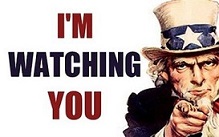
The tragic events of 9/11 marked a turning point in our nation’s recent civil rights history. First the terrorists attached us and then, in the name of national security, we began to attack ourselves.
It is almost cliché to say that we live in a surveillance state, but we do. Ever since Congress, on a fully bipartisan basis, enacted the Patriot Act, the ever-present eye of the government has been searching for new and creative ways to spy on American citizens. They have the technology to monitor all of our electronic devices, listen to our phone calls, and read our emails and text messages, all under the auspices of national security.
The unfortunate reality is that the bulk of the actions taken by law enforcement under the Patriot Act have almost nothing to do with combating terrorism. Most of the spying to date is for run-of-the-mill crimes that we’ve long expected law enforcement to address without special surveillance authority.
It is bad enough to have a politically neutral surveillance state controlled by the national security crowd and their DOJ cousins but, when put into the hands of an executive branch willing to weaponized its reams of information against its perceived political enemies, we’ve got a frightening problem on our hands.
Laws such as the Patriot Act were designed to fight the unique problem of terrorism but they quickly morphed into a mechanism by which the government keeps constant tabs on law-abiding Americans and threatens to disrupt their lives if they dare act contrary to those in power. It is within this world of omnipotent oversight and control the Justice Department now operates.
As an example, consider the 2020 election. The DOJ is currently issuing subpoenas to individuals who dared to question the election results as a backdrop of Biden’s vendetta against what he called “ultra MAGA Republicans.” This is a type of behavior you’d expect in a third world dictatorship.
Included in the DOJ’s crosshairs are those who participated in the political process as alternate electors; those in Congress who voted against certifying the election results; those who organized or peacefully attended a permitted rally on the Ellipse in Washington, D.C. on January 6, 2021, even if they had nothing to do with the activities at the Capital on that day; and those who have raised funds from donors with a promise to investigate and challenge election fraud.
All of these activities have long historical precedents in our country and are protected by the First Amendment. Indeed, it was Democrats who challenged the presidential election results in 2000, 2004, and 2016. Let’s review the evidence.
In 2000, 15 House Democrats objected to counting Florida’s electoral votes. Several members called the election “fraudulent,” and Texas Representative Eddie Bernice Johnson vowed that there would be “no peace” because of the allegedly stolen election.
In 2004, Democrats in Congress forced a vote to recess the joint session of Congress counting electoral votes in order to debate perceived election irregularities in Ohio. Thirty-one House Democrats oted to reject Ohio’s electoral votes and were applauded by Illinois Senator Dick Durbin, among others.
In 2016, several Democrats objected to the certification of Trump electors based on “overwhelming evidence of Russian interference” in the election. Maryland Representative Jamie Raskin objected to ten of Florida’s electors based on a Florida statue that prohibits state legislators from being electors. Texas Representative Sheila Jackson Lee proclaimed, “If in that voting, you have glaring matters that speak to the failure of the electoral system, then it should be challenged.”
No DOJ action was taken in any of these previous years. What has changed, if not the politicization of the Justice Department?
Elections are the engine of our Republic. They ensure the peaceful transfer of power and are the primary method for people to influence their government. Our Constitution’s elections clause, Article I, Section 4, Clause 1, gives states the primary duty of regulating the time, place and manner of elections for federal office. The DOJ’s role is very limited in this regard. It has the power to administer the Voting Rights Act, a power that was once necessary to push back on Jim Crow laws. But the era of Jim Crow is long gone, and it shouldn’t be up to a politicized DOJ to dictate what election integrity looks like.
The 2020 election was rampant with reports of irregularities. Some reports were more accurate than others. But states were right to take appropriate steps to increase the security of their elections in the wake of such reports. And yet, from its first days, the Biden administration has been bent on waging an intimidation campaign against any state that has attempted to bolster election integrity.
It is time to wake up to the danger.
You can read Harmeet K. Dhillon’s article, The Politicization of the Department of Justice, in full at Imprimis.

